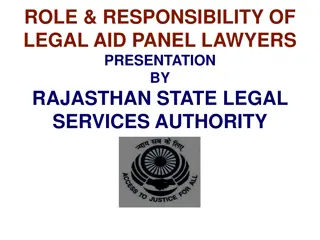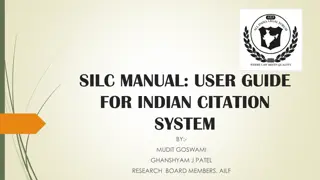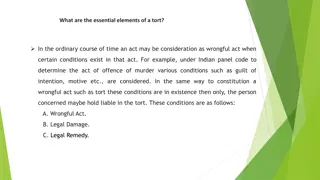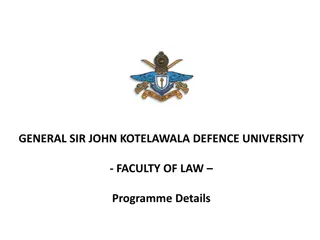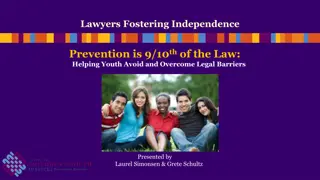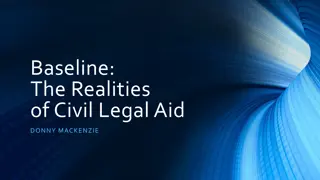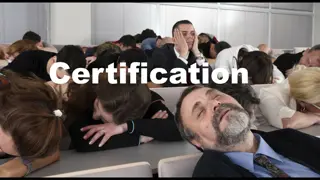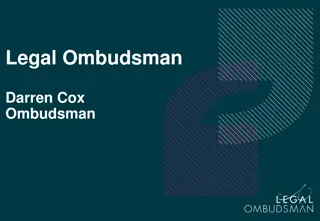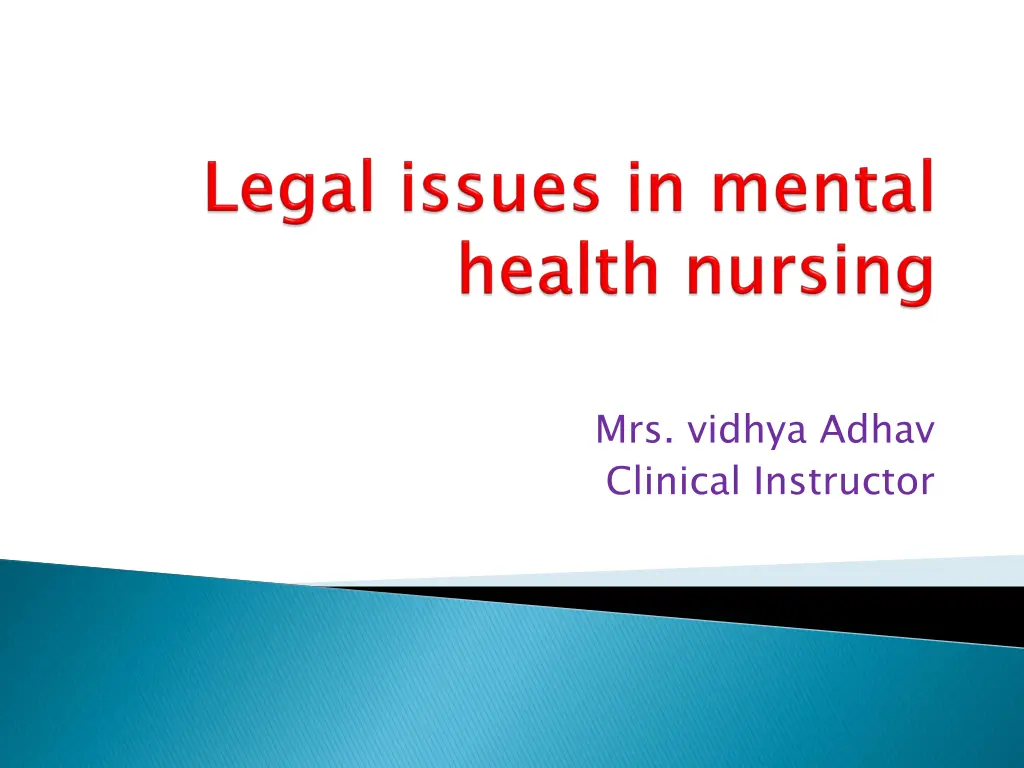
Legal Aspects of Mental Health Treatment in India
Explore the legal aspects related to the treatment of mentally ill individuals in India, focusing on the Indian Mental Health Act of 1987 and the Indian Lunacy Act of 1912. Learn about admission procedures, rights of voluntary and involuntary patients, and the importance of legal knowledge for psychiatric nurses.
Download Presentation

Please find below an Image/Link to download the presentation.
The content on the website is provided AS IS for your information and personal use only. It may not be sold, licensed, or shared on other websites without obtaining consent from the author. If you encounter any issues during the download, it is possible that the publisher has removed the file from their server.
You are allowed to download the files provided on this website for personal or commercial use, subject to the condition that they are used lawfully. All files are the property of their respective owners.
The content on the website is provided AS IS for your information and personal use only. It may not be sold, licensed, or shared on other websites without obtaining consent from the author.
E N D
Presentation Transcript
Mrs. vidhya Adhav Clinical Instructor
Psychiatric nurses have to work in psychiatric units for 24 hours and the final responsibility of the ward management will be on nurses alone. Hence, the nurses have to be well versed in the legal aspects related to treatment of mentally ill. The knowledge of legal procedures will help the nurses to teach the client and his relatives to protect the rights of the client and to provide comprehensive mental health care to the needy population. There are two Acts concerned with the care and treatment of the mentally ill: The Indian Mental Health Act of 1987 The Indian Lunacy Act of 1912
The Indian Mental Health Act ( MHA ) was drafted by the parliament in 1987 but it came into effect in all the states and union territories of India in April 1993. This act replaces the Indian Lunacy Act of 1912. Reasons for Enactment To prevent the stigma Mentally ill individuals should be treated like any other sick persons. To make fresh legislation in accordance with the new approach.
Admission on voluntary basis Admission under Authority / Order Admission under special circumstances Admission on authority or reception order Reception on production before Magistrate Reception after inquest Reception order on application Admission in Emergencies Temporary Treatment Order Admission of Mentally Ill Prisoners Miscellaneous Admission
Any person who considers him self to be mentally ill and wishes to be admitted to a psychiatric hospital may apply to the medical officer-in-charge; if he is a minor, the guardian can make this application on his behalf. The medical officer should make inquiry within 24hours and should admit the patient if he opines that treatment is required. The voluntary patient thus admitted is now bound to abide by the rules made by the institution. 2.Admission under Special Circumstances Any mentally ill patient who is unwilling for admission on a voluntary basis may be admitted and kept as an inpatient in a psychiatric hospital/ nursing home. For such purpose an application should be made out on his/her behalf by a relative or a friend of the mentally ill person, provided the medical officer deems fit. 2.Admission under Special Circumstances
On application: Only a relative not other than husband, wife, guardian or a friend can make out an application for the admission of a mentally ill patient. On production before the magistrate: Mentally ill patients exhibiting violent behavior, creating obscene scenes and dangerous to the society can be detained by the police officer and produced in court within 24 hours Petition Examination Determination Medical administrator Release Hospitalization Emergency to control on immediate threat to self or others Short term for diagnosis and short term therapy Long term for treatment and determined ready for discharge 4.Admission in Emergencies 4.Admission in Emergencies The medical officer in-charge may order the admission of a mentally ill patient if he thinks he is dangerous to himself or others. However the patient should be produced before the magistrate within 24hours (maximum time limit is 72hours, which is exclusive of the examination period), or the magistrate himself may visit the psychiatric hospital/ nursing home and pass reception order on examination.
REUEST BY A MAJOR/GUARDIAN OF THE MINOR ADMISSION TO MEDICAL OFFICER MEDICAL OFFICER MAKES ENQUIREIS WITHIN 24 HOURS IF THE MEDICAL OFFICER IS SATISFIED FOR ADMISSION VOLUNTARY ADMISSION IS MADE
Petition Examination Determination Medical Administrator Release Hospitalization Emergency To Control Short term for long term for treatment Immediate diagnosis and Treatment and to self or others short term therapy determined discharge
Patient is unwilling or unable for admission relative /friend an application to medical officer on behalf of the patient Medical officer makes enquires within 24 months If medical officer is satisfied for admission Involuntary admission is made
Application is made by a relative /friend to the magistrate Application should be supported by two medical certificates Magistrate consent from the medical officer in charge of mental hospital /nursing home Admission under reception order is made
Mentally ill patient exhibiting violent behavior detained by police officer Produced in the court within 24 hour of detention Application is supported by two medical certificates Magistrates issues reception order
Temporary Treatment Order It is an order issued by the magistrate in cases where the risk is perceived to the patient's life or to that of others. If the medical officer in-charge feels it necessary to bring legal authorities into the picture he can do so by applying to the magistrate. Temporary Treatment Order Admission of Mentally Ill Prisoner A mentally ill prisoner may be admitted into a mental hospital on the order of the presiding officer or a court. Admission of Mentally Ill Prisoners s MiscellaneousAdmission A mentally ill patient can be admitted either on humanitarian grounds (e.g. wanderers) or for observation purpose. Social workers can obtain an order from the magistrate pending report from medical officer. MiscellaneousAdmission
Discharge on Voluntary Basis. Discharge of a Patient Admitted under Special Circumstances. Discharge of a Patient Admitted on Reception Order. Discharge of a Patient Admitted by Police Discharge of a Mentally ill Prisoner Leave of Absence
Discharge of a Patient Admitted on Voluntary Basis Medical officer in-charge of psychiatric hospital/ nursing home on recommendation from two medical practitioners preferably a psychiatrist, can issue directions for discharge of the patient. Discharge of a Patient Admitted under Special Circumstances A relative or a friend may make an application to the medical officer for care and custody of the patient. The relatives are required to furnish a bond with or without sureties, along with an undertaking that the mentally ill person shall be prevented from causing injury to self or others. Discharge of a Patient Admitted on Reception Order An applicant who feels that the patient has recovered from illness may make an application for discharge to the magistrate. A certificate should accompany such an application from medical officer in-charge of the psychiatric hospital/nursing home. If the magistrate deems fit he may issue an order for discharge.
Discharge of a Patient Admitted by Police In cases where the police detain the mentally ill individual in hospital, he may be discharged after the family members agree in writing to take proper care, and the medical officer-in-charge opines that he is fit to be discharged. Discharge of a Mentally Ill Prisoner The hospital authorities have to report every 6 months about the person's state of mind to the authority, which had ordered detention. As soon as they find that the person is fit to stand the trial, they have to inform about the same to the authority concerned. The person is then handed over to the prison officer for further legal action. Leave of Absence On application by a relative or others to the medical officer-in-charge and a bond duly signed stating that the patient will be taken proper care of and prevented from injuring self or others, leave of absence may be granted (for a period of maximum 60days).
The legal and ethical context of care is important for all psychiatric nurses because it focuses concern on the right of patients and the quality care they receive. The knowledge of legal aspects enhances the freedom of both the nurse and the patient, informs their ethical decision making, and ultimately results in better care
It is derived from English Lunacy Act, It was enacted to govern reception, detention and care of lunatics and their property and to consolidate and amend the laws relating to lunacy. The enactment of ILA of 1912 was followed by opening of many new asylums, an improvement in the general conditions of asylums, and an increase in awareness regarding the prevailing situation of lunatics in such asylums.
Psychiatric patients are often the least capable of protecting their own rights. It is therefore one of the responsibilities of the nurse to guide the patients and relatives in matters related to their rights and protect the patient from any mistreatment.
The right to wear their own clothes The right to have individual storage space The right to keep and use their own personal possessions. The right to spend a sum of their money The right to have reasonable access like telephone, letter writing and mailing. The right to see visitors every day. The right to treatment in the least restricted setting. The right to hold civil service status. The right to refuse electroconvulsive therapy. The right to manage and dispose of property and execute wills. .
for protecting patient's rights To protect patient's rights, the nurse should be aware of these rights in the first place. She should ensure that ward procedures and policies should not violate patient's rights. Discussing these rights with the mental health team and including these rights in the nursing care plan is all part of her responsibility in protecting the patient's rights
Definition Forensic psychiatry is the branch of medicine that deals with disorders of the mind and their relation to legal principles. The basic forensic psychiatry includes: 1) Crime and psychiatric disorders 2) Criminal responsibility 3) Civil responsibility 4) Laws relating to psychiatric disorders Admission procedures of patients in a psychiatric hospital 5) Civil rights of the mentally ill 6) Psychiatrists and the court .
These are close associations between crime and psychiatric disorders like schizophrenia, affective disorders, epilepsy, personality disorder particularly antisocial personality and drug dependence disorders.his property, which may include sale or disposal of the property to settle his debts / expenses Mentally ill people may commit offence because: They do not understand the implication of their behavior Due to delusions and hallucinations Abnormal mental states like confusion, excitement etc. Drug related violence
According to section 84 of the Indian Penal Code of 1860 Nothing is on offence which is done by a person who, at the time of doing it, by reason of unsoundness of mind, is incapable of knowing the nature of the act, or that he is doing what is either wrong or contrary to law . Criteria used to determine criminal responsibility: M Naghten s rule The irresistible impulse test The Durham test/ Product rule American law institute Irresistible Impulse Act According to this rule, a person may have known an act was illegal but as a result of mental impairment lost control of their actions.
Management of Property: The court may on an application from any relative direct an inquiry to ascertain whether a person is of unsound mind and incapable of managing his property. In such a case a manager is appointed by the court of law to take care of 1) 2) Marriage :(marriage between any two individuals one of whom was of unsound mind at the time of marriage is considered null and void in the eyes of the law Unsoundness of mind for a continuous period can be sighted as a ground for obtaining divorce. The other party can file for divorce when lunacy continues for a period of more than 2 years after marriage. However if divorce is filed after a 3year period, divorce is granted with a precondition that the other party has to pay maintenance charges for the mentally ill person.
3-Testamentary Capacity As per the Indian Succession Act, testamentary capacity of the mental ability of a person is a precondition for making a valid will. The testator must be a major, free from coercion, understanding and displaying soundness of mind. At times doctors and nurses are called upon to witness the will of an ailing person. Under such circumstances the doctor tests the testator for orientation, concentration and memory. A person affected by delusional disorder can also make a valid will if those delusions are not related to the disposal of the property. 4) Right to Vote A person of unsound mind cannot contest for elections or exercise the privilege of voting. In conclusion, nursing practice must confirm to pre-set legal standards and continuously reorient itself to the ever evolving legal standards. It is only the motivated and capable nurse who can incorporate legal knowledge while dispensing patient care, and it is to her that many patients will turn for information and care.
Laws Relating to Psychiatry in India The Care and Treatment Legislation (Mental Health Legislations) Criminal Responsibilities Formulation (Criminal Laws) Civil Status Provisions (Civil Laws) Mental Health Related Legislations Mental Health Act 1987 Persons with Disabilities Act 1996 Rehabilitation Council of India Act 1992 Juvenile Justice Act 1986 Consumer Protection Act 1986 Civil Laws Relating to Mental Ill Persons Indian Evidence Act 1925-Sec. 118 Law of Contract Sec.6, 11and 12 Right to Vote and Stand for Election- Act 326,102 of the Constitution of India Law of Torts Testamentary Capacity- Indian Succession Act 1925 Sec.59 Marriage and Mental Health Legislation -Indian Divorce Act 1869 - Parsi Marriage + Divorce Act 1936 -Dissolution of Muslim Marriage Act 1939 -The Special Marriage Act 1954 -The Hindu Marriage Act 1955,1976 -The Family Court Act 1984 Civil Laws Relating to Psychiatry Provisions as to Accused Persons of Unsound Mind - Secs.328- 339 Cr. Pc. 1973
Civil Laws Relating to Psychiatry Unnatural Offences Sec. 377 IPC (Sexual Perversions) Affrays (Sec.159 In Mania) Misconduct in Public under Intoxication (e.g. Alcohol Defense Sec.510 IPC) NDPS Act 1985(Amended 1988) Suicide and Indian Law Suicide is the only criminal act for which a person is punished if he fails in the attempt to do so "No person shall be deprived of his life" Act attempt to commit suicide punishable abetment of suicide an offence No specific laws for assisted suicide and euthanasia
In India the opium Act of 1857 was revised first in 1878. In 1950, the opium Act of 1878 was revised as the Opium and Revenue Laws Act 1950. On 16th September 1985, the above mentioned Acts were repealed and NDPSA Act 61 of 1985 was enforced. .
Narcotic drugs (opium, poppy, straw, cannabis, cocaine, coca and all related synthesized drugs) and psychotropic substances (76drugs and their derivatives e.g. major tranquilizers, minor tranquilizers, pentazocine, barbiturates etc.). In this act if a person produces, possesses, transports, imports, sells, purchases or uses any narcotic drugs or psychotropic substances (except 'Ganja') he shall be punishable with Rigorous imprisonment for not less than 10years, which may be extended up to 20 years and a fine of not less than 1 lakh rupees, which may extend to two lakh rupees. For repeat offence a rigorous imprisonment of not less than 15 years which may be extended up to 30 years and a fine of not less than 1.5 lakh rupees, which may be extended up to 3 lakh rupees. For handling 'Ganja', a rigorous imprisonment which may extend to 10years and a fine up to 1lakh rupees. On carrying' small quantities' e.g. Heroin - 250 mg, Opium - 5 gm, Cocaine - 125 mg, Charas - 5gm, as were later specified in this act, the punishment may extend to 1year or a fine or both. For Ganja, (below 500gms),imprisonment is up to 6months. Under a specified court order, there is a provision for detoxification of the patient.
Under a later enactment, the prevention of illicit traffic in Narcotic Drugs and Psychotropic Substances Act (NDPSA) 1988 (Act 46) has been passed. Now there is a provision for preventive detention, seizure of property, death penalty if a person is bound to be trafficking more than or equal to 1 kg of pure heroin despite conviction and warning on the first attempt. no other type of nursing are the legal and ethical considerations of practice so crucial as in psychiatric nursing. Thus, knowledge of the law regarding psychiatry in the area where the nurse is practicing helps her to protect herself from liability and the patient from unnecessary detention and mistreatment.
A most important feature of the admission procedure involves settling the patient in the ward. introducing him to the other staff members and patients. Before assigning him a bed consider his biological and emotional needs. If he seems to be nurturing suicidal ideation or is floridly psychotic, he should be located in a place where he can be closely observed . He should be shown various facilities like availability of bathroom, recreation, refreshments, etc Acquaint him with some of the ward rules, e.g. meal time, ward activities, visiting hours, how to make appointments to see staff members, timings of any group meetings,
The patient and his relatives are likely to have all sorts of anxieties about various procedures and investigations. The nurse needs to be sensitive to these feelings, and give enough time and attention and allow them to express their feelings about the patient's condition, treatment and outcome. All information should be provided as appropriate. Head to foot observation for any injury Orientation to ward structure, policies. Find out whether patient had food before admission Enquire about any legal issue that the patient has prior to admission Perform history collection and MSE. Write nurse notes; enter in admission re
IT is the permission given to patients to perform certain rituals or attend certain family functions. Relatives are clearly instructed about the purpose for which the patient is being sent home and when he should be brought back. Instruct the relatives as to how they should converse or behave with the mentally ill person according to the instructions given by the doctor. If the patient is receiving any medications, insist on regularity and give necessary instructions to the family members about dosage, side effects, etc. The relatives be asked to observe communication pattern, sleeping pattern, drug allergy, socialization, ability to perform role.
Nurse must ensure that the patient leaves the unit with all belongings and personal effects, has the appropriate medications with him, and appointment for follow-up has been made and understood. All necessary instructions especially regarding his medication regimen, side-effects etc. must be clearly given to the patient and his family members. Any paper work, signing of documents should be completed. The hospital file along with all charts and notes should be sent to the medical records section. The nurse should ascertain his travel plan and offer assistance if necessary. The nurse must bear in mind that the patient may have mixed feelings about leaving the hospital and going back to his home environment. She should help him cope with any distress about separating from his newfound friends and staff members.
Nurses and other health care providers must never violate the rights of mentally ill patients. Nurses must be aware of: Both the laws in the state in which they practice Patient s rights Criminal and civil responsibilities of mentally ill patients Legal documentation The nurse should Protect the patient s rights Keep legal records safely Maintain confidentiality of patient information Take informed / substitute consent from patient / relatives for any procedure Explain based on level of anxiety, span of attention and level of ability to decide
Malpractice involves the failure of professionals to provide proper and competent care that is given by the members of their profession, resulting in harm to the patient. For Malpractice the following elements of Nursing negligence must be proved 1) A legal duty of care existed The nurse performed the duty negligently The damages were suffered by the plaintiff as a result Damages were substantial 2) Common areas of liability in psychiatric services Patient suicide Failure to diagnose Problems related to electroconvulsive therapy Misuse of psychoactive prescription drugs Breach of confidentiality Failure to obtain informed consent Inadequate supervision by trainers and employees Failure to report abuse inventions and evaluation of the patients response to care accurately
3) Steps to avoid liability in psychiatric services The nurse is responsible in reporting information to co-workers involved in patient care Maintain the records accurately and clearly Maintain confidentiality of patients information Practice within the scope of state laws and nurse practice act Collaborate with colleagues to determine the best course of action Use established practice standard to guide decisions and action Always put patient rights and welfare first Develop effective interpersonal relationship with patients and family Document all assessment data, treatment, int
Information gathered verbal or written should kept confidentialtity between nurse tp patient 2) Informed Consent Informed consent is more than simply getting a patient to sign a written consent form. It is a process of communication between a patient and a nurse that results in a patient s authorization or agreement to a specific medical intervention
. The informed consent should include The patient s diagnosis if known Nature and purpose of a proposed treatment or procedure Mode of administering the treatment The risk and benefit of a proposed treatment or procedure Alternate treatment procedures risks and benefits The risk and benefits of not receiving treatment Though most of the patients perceive and act in their own best interests, some may not be capable of giving a valid consent. Due to such variations, the patients have to be screened for the following: Legal age and sound mind Intelligence and understanding ability Ability to express choices Capacity to comprehend the information given about the treatment. .
It refers to the situation Where a patient is not capable of giving their own consent to the proposed treatment. In such cases authorization is given by another individual, being a guardian appointed by the court or the kith and kin on behalf of the patient. Informed consent to be obtained for the following conditions: Admission of a person to a psychiatric hospital on a voluntary basis. Procedures like ECT, psycho-surgery and other invasive investigatory procedures like lumbar puncture, spheoidal EEG, etc. Pentothal analysis (narco-analysis) Drug treatments like disulfiram therapy and clozepine therapy Administration of any research drugs (drug trails) 5) Record Keeping Nursing notes and progress records constitute legal documents and hence should be maintained carefully. They should be non- judgemental and the statements made should be objective in na
Escape from mental hospital Death Pregnacy Unknown patient Mentally ill offender




